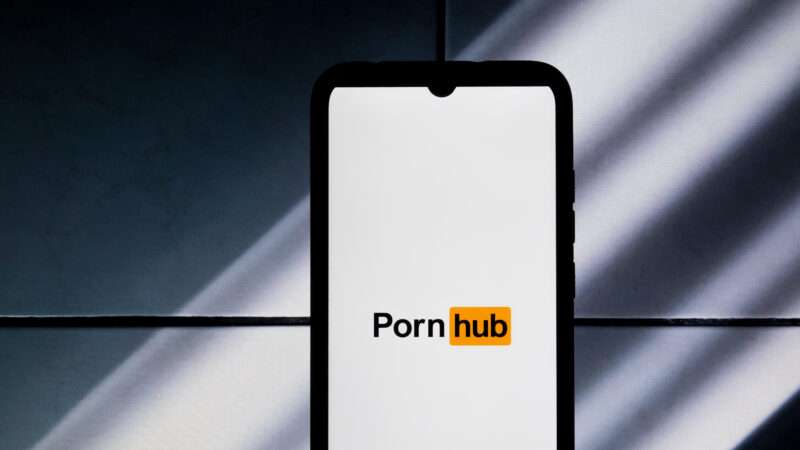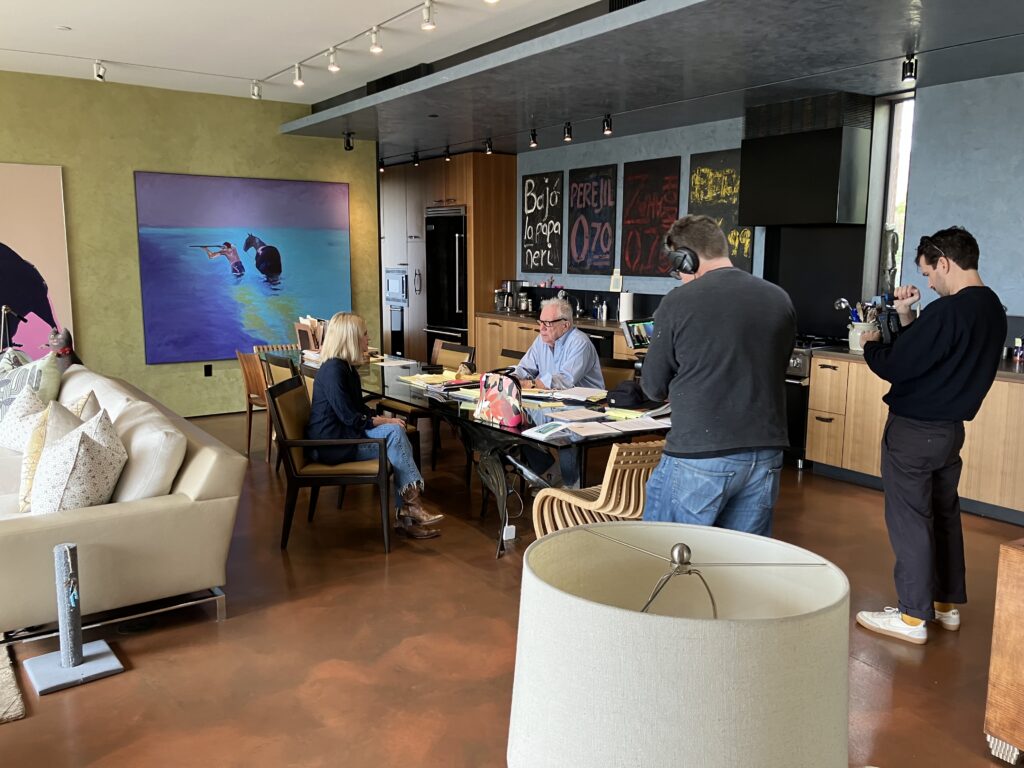
Pornhub has begun blocking visitors from Texas, where the authorities are attempting to enforce a new law requiring web porn platforms to check viewer ages. The company called the law "ineffective, haphazard, and dangerous."
Since Pornhub pulled out, Texans have greatly increased Google searches for tools to mask the geographic location of their devices.
We've been here before—with age-check laws, attempts to get around them, and porn platforms cutting off access. In fact, Texas is the seventh state that adult content platforms run by the Canadian company Aylo (formerly MindGeek) have left over age verification requirements. As a result, residents of Texas and six other states are blocked from visiting such popular sites as Pornhub, Redtube, and YouPorn.
There may be a better way forward when it comes to thwarting minors' access to porn while still protecting adult privacy and free expression. But it's also more complicated—and less likely to indiscriminately punish porn platforms, producers, and performers. Unsurprisingly, politicians don't seem interested.
'Not an Effective Solution'
Pornhub went dark in Texas last Thursday, following a late-February lawsuit filed by state Attorney General Ken Paxton against Aylo. Paxton has accused the company of failing to follow the state's age verification law, which requires adult-content websites to make sure viewers are at least 18 years old. A federal court has called the new Texas law unconstitutional. But the 5th Circuit Court of Appeals then gave the state a green light to start enforcing it—hence Paxton's lawsuit.
"As you may know, your elected officials in Texas are requiring us to verify your age before allowing you access to our website," reads a message on Pornhub that now greets visitors from Texas. "Not only does this impinge on the rights of adults to access protected speech, it fails strict scrutiny by employing the least effective and yet also most restrictive means of accomplishing Texas's stated purpose of allegedly protecting minors.
"While safety and compliance are at the forefront of our mission, providing identification every time you want to visit an adult platform is not an effective solution for protecting users online, and in fact, will put minors and your privacy at risk," the statement continues. "Attempting to mandate age verification without any means to enforce at scale gives platforms the choice to comply or not, leaving thousands of platforms open and accessible. As we've seen in other states, such bills have failed to protect minors, by driving users from those few websites which comply, to the thousands of websites, with far fewer safety measures in place, which do not comply."
Pornhub makes a good point, and one that prohibitionists of all sorts are wont to ignore. Banning (or putting up major barriers to) products that people want doesn't stop people from wanting and accessing those products. It simply bars people from accessing them in the safest and most transparent way possible. And this is especially true where the internet is concerned, since the internet is a global and not easily constrained phenomenon.
There will always be websites willing to provide porn without carding viewers. These platforms are also less likely to take other steps to stay within regulatory or creator-protective limits. By driving viewers away from platforms like Pornhub—sites that engage in at least some content moderation, are relatively receptive and responsive to authorities, and are willing to forge mutually beneficial partnerships with porn creators—age verification laws could actually increase viewership of exploitative or otherwise undesirable content.
"The Texas law for age verification [won't] actually protect children," suggested Pornhub. "But it will…reduce content creators' ability to post and distribute legal adult content and directly impact their ability to share the artistic messages they want to convey with it."
Age Verification Fallout
"Searches by Texas users for the term 'VPN' jumped more than fourfold" after Pornhub blocked access to Texans, Variety reports.
VPN stands for virtual private network, a tool used to mask the geographic location of internet users. Using a VPN, a resident of Texas could access Pornhub content by appearing to be located in some state where Pornhub is not blocked.
We've seen similar spikes in interest in VPNs in other states where Pornhub has blocked users.
States where Pornhub (and sister sites, such as Redtube and YouPorn) are now blocked include Arkansas, Mississippi, Montana, North Carolina, Texas, Utah, and Virginia. Each of these states recently enacted an age verification requirement for adult content websites. Last March, Utah became the second state to enact such a law, and the first to find residents blocked by Pornhub. The Arkansas, Virginia, and Mississippi laws—and Pornhub blocks—started last summer. The North Carolina and Montana laws took effect this past January, with Pornhub blocking access shortly before that.
The Louisiana Difference
Louisiana was the first state to enact a law requiring web porn platforms to verify visitor ages. Yet Pornhub has not blocked visitors from Louisiana. Why?
The difference is in the details of complying with Louisiana's law. Verifying visitor ages in Louisiana does not require porn sites to directly collect user IDs. Rather, the state's government helped develop a third-party service called LA Wallet, which stores digital driver's licenses and serves as an online age verification credential that affords some privacy.
Using this service does not require people to turn over their real identities to porn sites. "Through LA Wallet's [Anonymous Remote Age Verification] capabilities, adult content sites can anonymously verify the age of users," its website states.
This system isn't perfect, but it is less invasive than the alternative—closer to a convenience store clerk glancing at someone's ID than to creating a gigantic porn viewer database linked to real identities. This makes it more attractive to people visiting porn platforms and to the platforms themselves.
Louisiana's law may still pose privacy risks and infringe on free speech. But at least Louisiana attempted to mitigate these issues, unlike the other states that have passed age verification laws. It took the time to develop a system that allows adult content sites to anonymously verify users, instead of just telling tech and content companies to work it out themselves, user privacy be damned.
A Better Way Forward?
It's pretty clear that the days of open-access digital platforms are receding. Online age verification proposals—not just for porn but for social media—are sweeping the country. Last year, age-check laws aimed at adult content were introduced in at least 11 states. And so far this year, at least seven states (Georgia, Idaho, Indiana, Iowa, Kansas, Ohio, and Oklahoma) have seen proposals put forth to card visitors to online porn platforms.
The Free Speech Coalition, an adult industry trade group, has challenged some of these laws in court, as have some porn platforms.
But Aylo—which was acquired by Ethical Capital Partners last year—has another idea as well. It wants to see age restrictions implemented at the device level.
"We believe that the real solution for protecting minors and adults alike is to verify users' ages at the point of access—the users' devices—and to deny or permit access to age-restricted materials and websites based on that verification," Alex Kekesi, Aylo's vice president of brand and community, explained in an emailed statement. (He also said "this is not the end" of the Pornhub battle in Texas and that the company is "reviewing options and consulting with our legal team.")
Device-based verification could work in different ways, but the basic advantage is that it can keep internet porn away from kids without implicating adult user privacy.
In a device-based system, parents could make sure their minor kids' devices were specially equipped with a mechanism to alert websites that person using it is under 18. This device-based trigger—which could work equally well on porn, social media, or other platforms where people might want to proactively restrict access for kids—could accomplish the goal of restricting access to some group of users without requiring every user to forgo anonymity.
There's also a more expansive way of doing device-based verification, which would require anyone using a smartphone or computer device to verify their age with the device provider (as opposed to making it an opt-in thing). This option would obviously be more of a burden on adult user privacy, and therefore is more objectionable. Jonah Aragon lays out an array of potential problems with this approach here.
Either way—kids-only or more expansive—"such an approach requires the cooperation of manufacturers and operating-system providers," noted Pornhub in the statement now visible to Texas visitors.
I think this helps explain why we see less of a push for device-level verification. Computer and smartphone companies have more political clout than porn companies; it's much easier for politicians to make special demands of the latter than the former.
Add the facts that 1) politicians are lazy and 2) at least some of them want to reduce porn viewership more broadly and not just for minors, and it's not hard to imagine why politicians have been focused on making porn companies card users rather than pushing for device-based solutions.
For what it's worth, a voluntary, device-based technical solution isn't just better from a civil liberties standpoint; it may also be better at restricting access for kids.
The initial ruling against Texas' age verification law, "noted that Texas' own studies tended to show that content filtering and parental controls would be more effective, and better tailored, than age verification," First Amendment lawyer Ari Cohn pointed out last year. And while some people suggest that these voluntary parental control measures don't cut it because parents are too dumb or careless to use them, "that does not allow the government to sidestep them as a less restrictive means," Cohn noted.
Today's Image

The post Pornhub Pulls Out of Seventh State appeared first on Reason.com.







